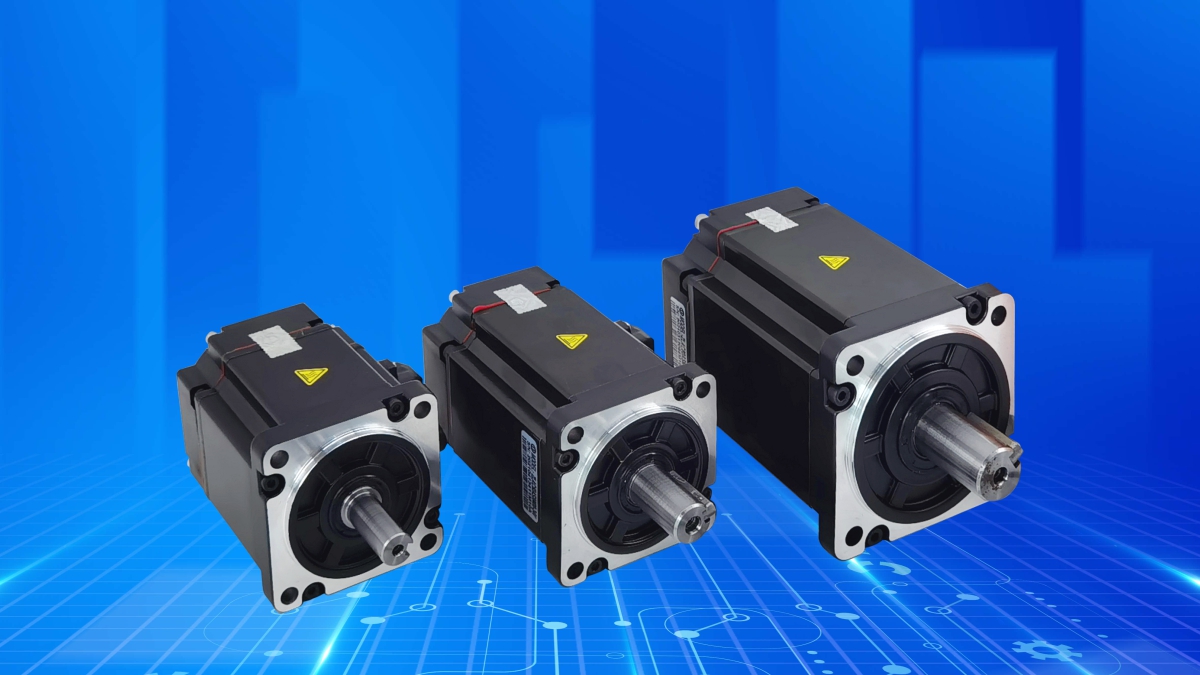The rotor inside the AC servo motor is a permanent magnet, and the U/V/W three-phase electricity controlled by the driver forms an electromagnetic field. The rotor rotates under the action of this magnetic field. At the same time, the encoder provided by the motor feeds back a signal to the driver, and the driver compares the feedback value with the target value to adjust the angle of rotation of the rotor. The accuracy of servo motors depends on the accuracy (number of lines) of the encoder.
A DC servo motor comprises a stator, a rotor iron core, a motor shaft, a servo motor winding commutator, a servo motor winding, a speed measuring motor winding, and a speed measuring motor commutator. The rotor iron core is composed of silicon steel laminations laminated and fixed on the motor shaft.
1. Different structures
The structure of an AC servo motor is similar to that of an AC asynchronous motor. There are two excitation windings and a control winding on the stator with a phase space displacement of 90 ° electrical angle. They are connected to a constant AC voltage and use the changes in AC voltage or phase applied to the windings to control the operation of the motor.
The structure of a DC servo motor is similar to that of a DC motor, including a stator, rotor iron core, motor shaft, servo motor winding commutator, servo motor winding, speed motor winding, and speed motor commutator. The rotor iron core is composed of silicon steel laminations laminated and fixed on the motor shaft.
2. The principle is different
The stator three-phase coil of the AC servo motor is powered by a servo coding control circuit, and the rotor is permanent magnet. The direction, speed, and angle of the motor are determined by the coding controller. The rotor of a DC servo motor is also made of permanent magnets, while the stator winding is powered by a servo encoded pulse circuit.
3. Different classifications
DC servo motors are divided into two types based on the presence or absence of carbon brushes: brushed DC servo motors and brushless DC servo motors. AC servo motors belong to brushless motors, which are divided into synchronous and asynchronous motors.
4. Different control methods
There are three control methods for AC servo motors: amplitude control, phase control, and amplitude phase control. There are two main control methods for DC servo motors: armature voltage control and excitation field control.
5. Different maintenance costs
Convenient maintenance of communication servo motors. DC servo motors are easy to achieve speed regulation and high control accuracy, but they have high maintenance costs and are difficult to operate.
6. Different mechanical characteristics
The characteristic of AC servo motors is relatively soft. When the rated torque is reached, if the load torque increases, it is easy to cause sudden stall. However, DC motors have fast response, large starting torque, and the ability to provide rated torque from zero speed to rated speed. Although AC motors do not have carbon brushes and rectifiers, they are maintenance free, sturdy, and widely used. However, to achieve performance equivalent to DC motors in terms of characteristics, complex control technology is required.
(1) Characteristics of AC servo motors
Features: Good speed control characteristics, smooth control can be achieved throughout the entire speed range, almost no oscillation, high efficiency of over 90%, and low heat generation. High speed control, high-precision position control (depending on encoder accuracy), stable operation, good controllability, fast response, high sensitivity, and strict nonlinearity indicators for mechanical and regulatory characteristics. Within the rated operating area, it can achieve constant torque, low inertia, low noise, no brush wear, and maintenance free (suitable for dust-free and explosive environments).
(2) Characteristics of DC servo motor
Features: Accurate speed control, hard torque speed characteristics, simple control principle, good linear adjustment characteristics, fast time response, easy to use, and affordable price.
Since its establishment, Shenzhen Zhongling Technology Co., Ltd. has been focusing on the research and development, production, and performance optimization of robot servo motors. With the values of focus, innovation, integrity, and pragmatism, we provide customers with first-class products and solutions, allowing every partner to use our products with confidence. 
Mailbox:sales@zlingkj.com
Office address:303, 3rd Floor, Building B, Fenghuang Zhigu, Tiezi Road, Xixiang Street, Bao'an District, Shenzhen
Factory address:7th Floor, Building 1, XinLiKang LeChuangLi Smart Industry Park, No. 106 Changdong Road, Changping Town, Dongguan City, Guangdong Province, 523570.